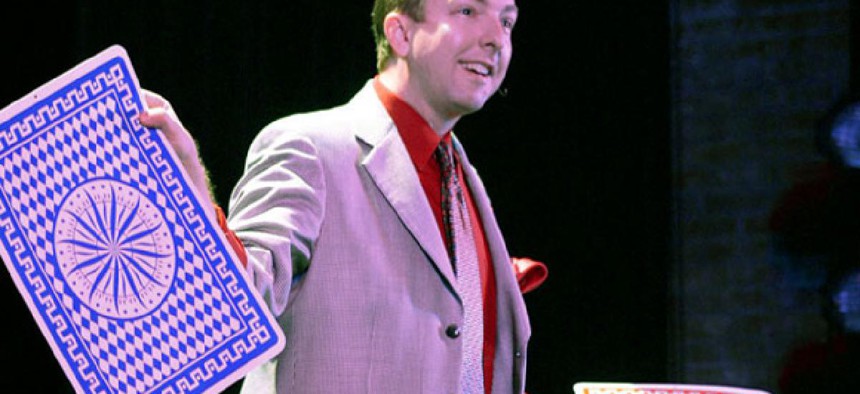
Professional magician Joe M. Turner. Photo by Mike Nalley
Magic acts at conferences can add substance, professionals say
Senator demands that NOAA turn over details on conference spending.
“The Magic of Change” was to be the theme of the now canceled presentation by a magician-cum-inspirational speaker planned for a National Oceanic and Atmospheric Administration conference in June. That’s also the title of a presentation given by corporate executive-turned magician Joe M. Turner.
But Turner said he learned of NOAA’s project only by reading about it in the Atlanta Journal-Constitution, and he and other professional performers stress that the missteps of federal agency conference planners should not discredit the business value of lively conference presentations.
“I am all about opposing wasteful spending,” said Turner, a political conservative based in Atlanta who has spoken at tea party rallies. “But there are plenty of people who have entertainment experience who also can provide serious, credible information to others. The return on investment is not really captured when you call a speaker a magician.”
Turner spoke to Government Executive a day after news broke that NOAA posted, and then withdrew, its solicitation for a performer to help train 45 employees using inspirational exercises and magic tricks. It was also the same day Sen. Kelly Ayotte, R-N.H., wrote to NOAA Administrator Jane Lubchenco asking for an “immediate and thorough review of this solicitation and process.”
Ayotte, who serves on the Senate Commerce, Science and Transportation Subcommittee on Oceans, Atmosphere, Fisheries and the Coast Guard, also wants “compete details of the planned leadership conference, including cost, number of participants, speakers, activities, food and beverage services, and accommodations,” as well as similar details for NOAA conferences going back to 2007, plus plans for future conferences. The Washington Post reported Friday that the estimated cost of the NOAA contract would have been $5,000.
The Office of Management and Budget, asked to comment on the NOAA conference, recapped what agencies have done to reduce spending on conferences since a September 2011 memo from former budget director (now White House chief of staff) Jack Lew. Agencies have identified and begun to reap savings totaling nearly $1.2 billion, having achieved more than $280 million in reduced costs in the first quarter of fiscal 2012 compared to the same period in fiscal 2010. The Labor Department, OMB said, has identified more than 100 conferences to be eliminated; the Homeland Security Department has avoided more than $13 million in travel costs; the State Department is holding a majority of its conferences in government buildings rather than hotels; and the Agriculture Department has saved $47 million by switching from in-person events to video-conferencing.
To professionals such as Turner, a former corporate executive specializing in change who now bills himself as a “chief impossibility officer,” performers can greatly enhance communication to employees as long as a company or agency is making sure the performer’s message is fundamentally grounded in business. “Adding a little spark to get people engaged in the communication is better than 35 PowerPoint slides and charts,” he said.
If NOAA had booked a speaker clearly unrelated to the business, such as pro football star Tim Tebow or a pro baseball player or an actor, “I don’t think it would have been news,” added Turner, who has performed for public and private organizations but declines to specify which agencies. “But the word ‘magician’ opens it up to joking, even if the performer has legitimate expertise to share.”
Turner said if the NOAA solicitation were still active, “I would have read it and if I thought I could add value, I would have bid on it, as this is my business.”
Eric Henning, a professional magician and motivational speaker based in Laurel, Md., who has performed at the White House and the National Security Agency, told Politico on Thursday that he agrees magicians can be serious communicators.
Andy McNeill, chief executive officer of Fort Lauderdale, Fla.-based American Meetings Inc., said performers such as magicians and hypnotists are “quite popular” at conferences and because the field is “lucrative, they try to differentiate themselves. But at end of day, it’s about the content, and if content is worthwhile and appropriate, then the delivery and how they deliver it is just semantics.”
The value of hiring a performer depends on the core purpose of the conference, he said. “At a sales meeting, a presenter can pump up the sales team with a great sales message, but if it’s a training conference at NOAA, that’s a judgment call,” he noted.
For agencies and nonprofits, the issue in the conference industry, he said, is “optics.” Even if everything is “on the up and up,” he said, “if a conference lands at the Four Seasons Resort on Honolulu, there would be a big stink that it’s not appropriate. But if you dig in, you might find out that the hotel is under construction and offered a $150 room rate.” The event could add value and fit within the budget, he said, “but it wouldn’t matter because it’s all about the optics that go with speakers and entertainment.”







